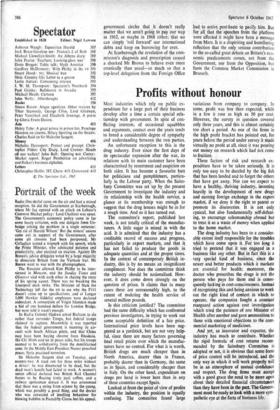Profits without honour
Most industries which rely on public ex- penditure for a large part of their business develop after a time a certain special rela- tionship with government. In spite of con- flicting interests, of occasional squabbles and, arguments, contact over the years tends to breed a considerable degree of sympathy and understanding between the two parties.
An unfortunate exception to this is the drug industry. Ever since the first days of its spectacular expansion after the war, its relations with its main customer have been characterised by resentment and suspicion on both sides. It has become a favourite butt for politicians and pamphleteers, particu- larly in the Labour party. When the Sains- bury Committee was set up by the present Government to investigate the industry and its relationship with the health service, a glance at its membership was enough to suggest that the drug houses might be in for a rough time. And so it has turned out.
The committee's report, published last week, is not totally critical of the manufac- turers. A little sugar is mixed in with the acid. It is admitted that the industry has a creditable record of success and progress, particularly in export markets, and that it has not failed toy produce the goods in adequate quantities and at the proper times. In the context of contemporary British in- dustry, this is by no means an insignificant compliment. Nor does the committee think the industry should be nationalised. How- ever, it does come down strongly on the question of prices. It claims that in many cases these are unreasonably high, to the extent of mulcting the health service of several million pounds.
Is this criticism justified? The committee had the same difficulty which has confronted previous investigators, in trying to work out some acceptable definition of a fair price. International price levels have been sug- gested as a yardstick, but are not very help- ful, since there are many factors governing final retail prices over which the manufac- turers have no control. For what it is worth, British drugs are much cheaper than in North America, dearer than in France, probably dearer than in Germany, the same as in Spain, and considerably cheaper than in Italy. On the other hand, expenditure on drugs per head is lower here than in any of these countries except Spain.
Looked at from the point of view of profits within the industry, the position is equally confusing. The committee found large variations from company to company. In some, profit was less than expected, while in a few it .rose as high as 50 per cent. However, the survey in question covered only three years, and this is almost certainly too short a period. As one of the firms in the high profit bracket has pointed out, for years before the period under survey it made virtually no profit at all, since it was pouring out money on research which had not come to fruition.
These factors of risk and research ex- penditure have to be taken seriously. It is only too easy to be dazzled by the big fish that has been landed and to forget the others that have got away. Nor can we. expect to have a healthy, thriving industry, investing heavily in the development of new drugs and earning foreign exchange in the export market, if we deny it the right to patent or promote its discoveries. It is not only cynical, but also fundamentally self-defeat- ing, to encourage salesmanship abroad but to treat it as a waste of money when applied to the home market.
The drug industry has been to a consider- able extent itself responsible for the troubles which have come upon it. Fol.- too long it tried to pretend that it was engaged in a business like any other. But in fact this is a very special kind of business, since the newer and better products which it markets are essential for health; moreover, the doctor who prescribes the drugs is not the person who pays for them and is conse- quently lacking in cost-consciousness. Instead of recognising this and being anxious to work out the right kind of context in which to operate, the companies fought a constant rearguard action against cost investigation which tried the patience of one Minister of Health after another and gave ammunition to those with emotional objections to the com- mercial marketing of medicines.
And yet, as innovator and exporter, the industry has much to contribute. Whether the rigid formula of cost returns recom- mended by the Sainsbury Committee is adopted or not, it is obvious that some form of price control will be introduced, and the only way in which it will work properly will be in an atmosphere of mutual confidence and respect. The drug firms must accept with a good grace the need to be more open about their detailed financial circumstances than they have been in the past. The Govern- ment must be ready to look with a more sym- pathetic eye at the facts of business life.


































 Previous page
Previous page